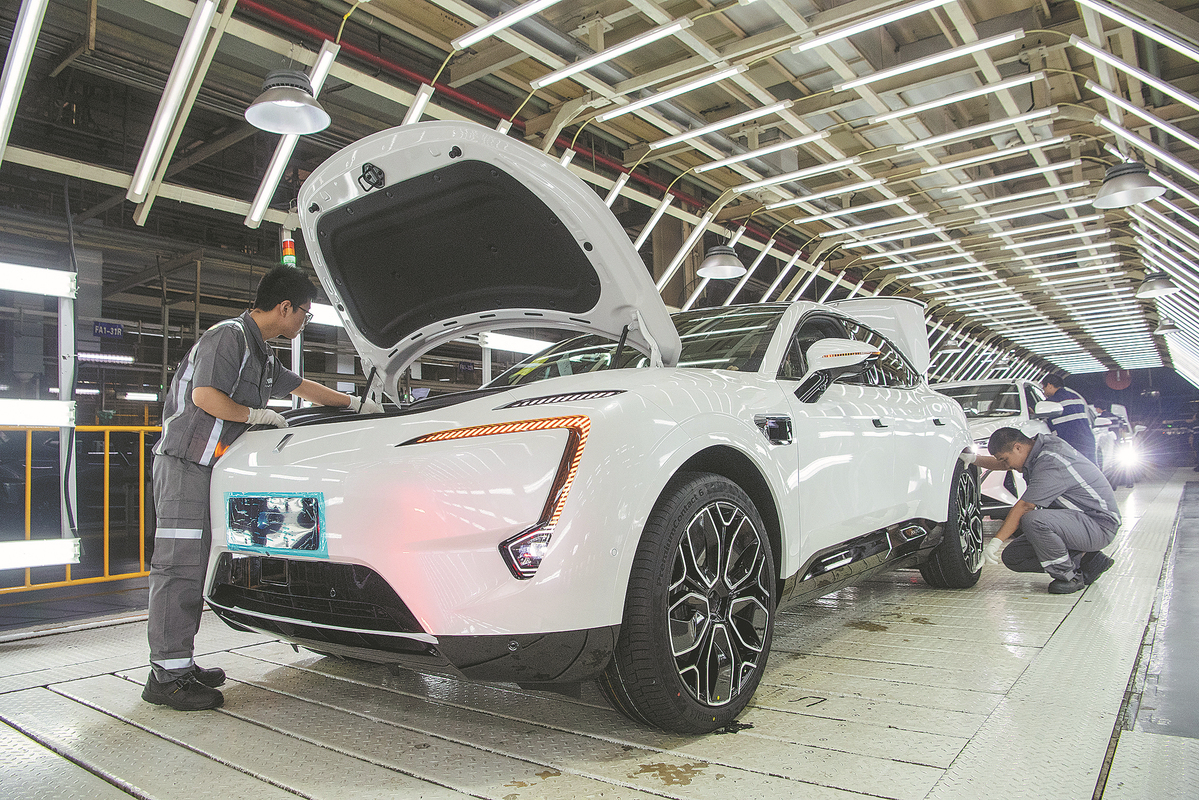Auto growth intact, global lead in sight
Govt official, industry experts voice optimism as 2023 data preview strong


China is optimistic about the growth momentum of the automobile industry this year, and the world's biggest auto market was expected to become the top auto exporter globally for the first time in 2023, said a senior official of the country's top industry regulator on Friday.
Although full-year data for 2023 is yet to be published, the official's optimism offers a glimpse of China's growing prowess in automobiles, especially new energy vehicles or NEVs and related industry chains like batteries, industry experts said.
Such obvious advantages will make the country's auto products very competitive worldwide amid a reconfiguration of the global supply chain, they said.
Xin Guobin, vice-minister of industry and information technology, said that based on industry estimates, both sales and production of automobiles will be able to achieve "stable growth" in 2024 and the momentum of new energy vehicles is expected to sustain this year.
Vehicle sales this year are likely to reach 31 million units, up 3 percent, while NEV sales will grow 20 percent to 11.5 million units, Xin said at a State Council news conference on Friday, citing data compiled by industry associations.
"Though the figures are based on preliminary estimates of industry associations and companies, we believe it is basically reliable," Xin emphasized.
As China exported 4.91 million vehicles in 2023, up almost 58 percent year-on-year, Xin said the country is expected to emerge as the world's top auto exporter in 2023 for the first time.
That would put China ahead of Japan, which exported 3.5 million passenger cars in the first 11 months of last year. The forecast for Japan's full-year exports is about 4.3 million cars. In 2022, China had surpassed Germany to be the second-largest car exporter.
Vasilis Trigkas, a visiting assistant professor at Schwarzman College, Tsinghua University, said: "The automobile sector further attests to China's qualitative transformation. Just five years ago, Chinese cars stood no chance against their European rivals. Meanwhile, China's industrial success across the renewable sector is unambiguous."
China's electric vehicle firm BYD also overtook US electric vehicle giant Tesla as the world's bestselling EV maker in the fourth quarter. It was for the first time BYD took the crown in terms of battery-only vehicle sales on a quarterly basis.
Xin said on Friday that NEV exports surged nearly 78 percent year-on-year to 1.2 million units last year while power battery exports surged 87 percent.
In a Citigroup research note led by economist Yu Xiangrong, Yu said that China's exports have seen a marked shift, with the "old three" of household appliances, furniture and clothing giving way to the high-tech "new three" of EVs, lithium-ion batteries and solar cells.
"The shifting export drivers demonstrate progress in China's industrial upgrading. China has clearly risen up the value chain and remains competitive amid a reconfiguration of the global supply chain," Yu said.
"This ability to manufacture a range of products from low-value consumer goods to high-tech innovative products provides resilience for China's exports, and continuing upgrades to manufacturing capabilities, R&D investment and emphasis on cost controls should help sustain its competitiveness in trade."
On Friday, however, Xin focused attention on some challenges facing the automobile industry. Insufficient consumption demand, rising protectionism from some foreign countries and regions, shortage of vehicle chips and superfluous NEV projects by some local governments and automakers are issues that need to be dealt with, he said.
China will likely effect forceful measures and also increase efforts to exempt vehicle purchase tax, drive the electrification of public transportation and promote NEVs in rural areas. Such steps would help in the healthy development of the automobile industry, Xin said.
chengyu@chinadaily.com.cn



































